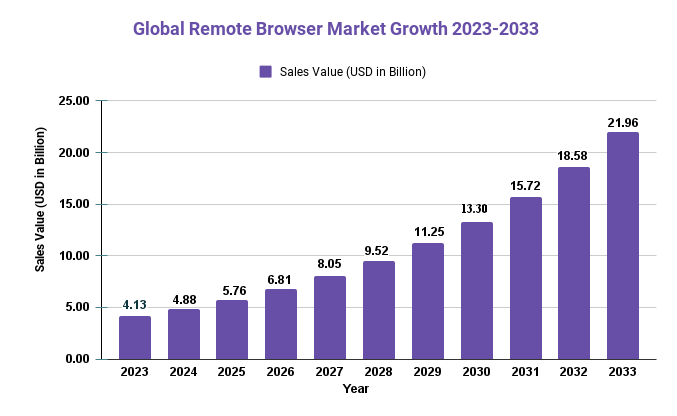Global Remote Browser Market Size Will Reach 21.96 Billion By 2033

Page Contents
Published Via 11Press: The Remote Browser market size was estimated to be around USD 3.49 billion and projected for a compound annual growth rate (CAGR) of 18.2% from 2023-2033.
Remote browsers are technologies that enable users to access a web browser from a distant server or cloud platform. This enables them to securely and privately browse websites and web-based applications without leaving a trace on their local device. The growing adoption of remote browser solutions across various industries, such as healthcare, BFSI, and government to guarantee secure web browsing and abide by data privacy regulations is driving the growth of this market.
Additionally, the growing trend of remote work and the need for secure remote access to web-based applications and data are propelling growth in this market. North America leads the way as it stands as the largest destination for remote browsers followed by Europe and Asia-Pacific; where increased demand for secure web browsing, as well as cloud-based solutions, is driving expansion in these regions.
Want to Access the Statistical Data and Graphs, Key Player's Strategies | https://market.us/report/remote-browser-market/request-sample
Key Takeaway
- The key takeaway for the Remote Browser market is that it is experiencing significant growth due to the increasing need for secure and private web browsing solutions, particularly in industries such as healthcare, BFSI, and government.
- Remote browsers allow users to access web-based applications and data from a remote server or cloud platform, ensuring data privacy and compliance with data protection regulations.
- The market is expected to continue growing at a CAGR of approximately 18.2% from 2021 to 2028, driven by the increasing trend of remote work and the need for secure remote access to web-based applications and data.
- North America is currently the largest market for remote browsers, followed by Europe and Asia-Pacific.

Regional Snapshot
- North America: North America is the leading market for remote browsers, with the United States accounting for most of the growth. This can be attributed to an increasing trend towards remote work and demand for secure remote access to web-based applications and data.
- Europe: Europe is the second-largest market for remote browsers, with countries such as Germany, the UK, and France driving growth in this space. The rapid expansion is being spurred on by cloud-based solutions' increasing adoption and the need for secure web browsing solutions in industries like healthcare and BFSI.
- Asia-Pacific: Asia-Pacific is expected to witness significant growth in the Remote Browser market due to the increasing adoption of remote work and cloud-based solutions in countries like China, India, and Japan. Furthermore, an increasing need for secure web browsing solutions within this region is further fueling market expansion.
- Middle East & Africa: The Middle East & Africa region is projected to experience moderate growth in the Remote Browser market, driven by increasing adoption of cloud-based solutions and an increased need for secure web browsing solutions in industries such as healthcare and government.
- Latin America: Latin America is projected to experience significant growth in the Remote Browser market, driven by rising cloud-based solutions and an increasing need for secure web browsing solutions in industries such as banking and government. Brazil and Mexico are leading contributors to this region's market expansion.
Drivers
- Growing Demand for Secure Web Browsing: The growing need for secure web browsing solutions is driving the growth of the Remote Browser market. Remote browsers enable users to securely access web-based applications and data from a distant server or cloud platform, ensuring data privacy and compliance with data protection regulations.
- Rising Trend of Remote Work: As remote work becomes more and more popular, demand for remote browser solutions has grown. These enable users to securely access web-based applications and data remotely, allowing them to work from any location without sacrificing data security.
- Increasing Adoption of Cloud-Based Solutions: The increasing adoption of cloud-based solutions is propelling growth in the Remote Browser market. Remote browsers are typically deployed on cloud platforms, enabling users to access web-based applications and data remotely with any device.
- Complying with Data Privacy Regulations: The need to adhere to data protection regulations such as GDPR and CCPA has spurred the demand for remote browser solutions. Remote browsers ensure data privacy and uphold GDPR/CCPA by giving users secure access to web-based applications and data stored on a remote server or cloud platform.
Restraints
- Dependence on Internet Connectivity: Remote browsers rely on Internet connectivity to access web-based applications and data. Poor internet connections or network disruptions can result in an unpleasant user experience, potentially hindering the adoption of remote browser solutions.
- Lack of Awareness: Lack of awareness regarding remote browser solutions remains a major obstacle for the market. Many organizations are still unaware of their advantages and may continue using traditional web browsers, potentially compromising data security.
- Integration with Existing Systems: Integrating remote browser solutions into existing systems and applications can be a complex undertaking, especially for organizations with complex IT infrastructures. This could pose a barrier to the adoption of remote browser solutions in these organizations.
- Cost of Implementation: Implementing remote browser solutions can be expensive for some organizations, especially small and medium-sized enterprises. To get the most benefit from these technologies, businesses must make significant investments in hardware, software, and IT infrastructure.
- Limited Customization Options: Remote browser solutions may offer fewer customization options compared to traditional web browsers, limiting organizations' ability to tailor the user experience according to their individual needs and specifications.
Opportunities
- Growing Demand for Remote Work Solutions: The growing trend toward remote work is creating opportunities in the Remote Browser market. As more organizations implement remote work policies, demand for these browser solutions is expected to surge.
- Integration with Other Cybersecurity Solutions: Combining remote browser solutions with other cybersecurity products like virtual private networks (VPNs) and endpoint protection platforms (EPPs) can open up new market possibilities for vendors. Such integrations offer organizations a comprehensive security solution.
- Advancements in Cloud Technology: Recent advances in cloud technology, such as edge computing and 5G networks, offer new prospects for the Remote Browser market. These innovations improve the performance and dependability of remote browser solutions, making them more desirable to organizations.
- Increased Adoption of Bring Your Own Device (BYOD) Policies: The growing adoption of Bring Your Own Device (BYOD) policies is creating new opportunities for the Remote Browser market. Remote browsers enable users to securely access web-based applications and data from their personal devices, allowing organizations to implement BYOD policies without compromising data security.
Make an inquiry before buying this report @ https://market.us/report/remote-browser-market/#inquiry
Challenges
- Security Concerns: Despite the security advantages of remote browser solutions, there remain security risks related to data privacy and protection. Remote browsers may be vulnerable to cyberattacks and data breaches, affecting user trust and limiting adoption rates.
- Limited compatibility with legacy systems: Remote browser solutions may have limited compatibility with legacy systems, which could present a challenge for organizations with complex IT infrastructures. This may restrict the adoption of remote browser solutions, especially in industries such as healthcare and finance.
- Performance Issues: Remote browser solutions may encounter performance issues due to their dependence on internet connectivity and server capabilities. This can affect user experience and limit adoption, particularly in regions with poor internet connections.
- User Experience: Remote browser solutions may offer a different user interface than traditional web browsers, which may prove challenging for some users who have been using traditional web browsers for some time.
Recent Developments
- Broadcom Inc. has acquired Symantec’s enterprise security business. This included its remote browser isolation tech.
- FireEye Inc. will launch its BrowserIsolation solution in 2020. This allows enterprise users to browse securely.
- Ericom Software, a provider of secure remote browsing solutions, announced the launch 2021 of Secure Remote Browser.
Key Market Segments
Type
- Chrome
- Firefox
- Opera
- Internet Explorer
- Safari
Application
- BFSI
- IT and Telecom
- Retail
- Healthcare
- Education
- Other
Key Market Players
- Symantec Corporation
- Citrix Systems Inc.
- Ericom Software
- Cyberinc
- Tucloud Federal Inc.
- Bomgar Corporation
- Cigloo Inc.
- Menlo Security
- Light Point Security
- Bromium Inc.
- Authentic8 Inc
Report Scope
| Report Attribute | Details |
| The market size value in 2022 | USD 3.49 Bn |
| Revenue Forecast by 2032 | USD 18.58 Bn |
| Growth Rate | CAGR Of 18.2% |
| Regions Covered | North America, Europe, Asia Pacific, Latin America, and Middle East & Africa, and Rest of the World |
| Historical Years | 2017-2022 |
| Base Year | 2022 |
| Estimated Year | 2023 |
| Short-Term Projection Year | 2028 |
| Long-Term Projected Year | 2032 |
Frequently Asked Questions
Q: What is the current market size for the Remote Browser Market?
A: According to a report by Market.us, the Remote Browser Market was valued at USD 3.49 billion in 2023 and is expected to reach USD 18.58 billion by 2033, growing at a CAGR of 18.2% during the forecast period.
Q: What are the key segments of the Remote Browser Market?
A: The Remote Browser Market can be segmented based on Type (Chrome, Firefox, Opera, Internet Explorer, Safari), By Application (BFSI, IT and Telecom, Retail, Healthcare, Education, Other), and geography (North America, Europe, Asia-Pacific, Latin America, and Middle East & Africa).
Q: Who are the key players in the Remote Browser Market?
A: Some of the key players in the Remote Browser Market include Symantec Corporation, Citrix Systems Inc., Ericom Software, Cyberinc, Tucloud Federal Inc., Bomgar Corporation, Cigloo Inc., Menlo Security, Light Point Security, Bromium Inc., Authentic8 Inc.
The team behind market.us, marketresearch.biz, market.biz and more. Our purpose is to keep our customers ahead of the game with regard to the markets. They may fluctuate up or down, but we will help you to stay ahead of the curve in these market fluctuations. Our consistent growth and ability to deliver in-depth analyses and market insight has engaged genuine market players. They have faith in us to offer the data and information they require to make balanced and decisive marketing decisions.



